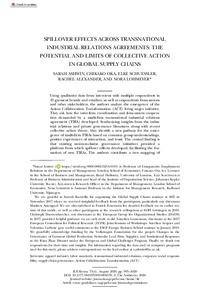Spillover effects across transnational industrial relations agreements: the potential and limits of collective action in global supply chains

Ashwin, Sarah ; Oka, Chikako ; Schuessler, Elke S. ; Alexander, Rachel ; Lohmeyer, Nora
2020
73
4
August
995-1020
labour relations ; labour standard ; multinational bargaining ; corporate social responsibility ; corporate governance ; living wage ; clothing industry
Collective bargaining
https://doi.org/10.1177%2F0019793919896570
English
Bibliogr.
"Using qualitative data from interviews with multiple respondents in 45 garment brands and retailers, as well as respondents from unions and other stakeholders, the authors analyze the emergence of the Action Collaboration Transformation (ACT) living wages initiative. They ask how the inter-firm coordination and firm–union cooperation demanded by a multi-firm transnational industrial relations agreement (TIRA) developed. Synthesizing insights from the industrial relations and private governance literatures along with recent collective action theory, they identify a new pathway for the emergence of multi-firm TIRAs based on common group understandings, positive experiences of interaction, and trust. The central finding is that existing union-inclusive governance initiatives provided a platform from which spillover effects developed, facilitating the formation of new TIRAs. The authors contribute a new mapping of labor governance approaches on the dimensions of inter-firm coordination and labor inclusiveness, foregrounding socialization dynamics as a basis for collective action and problematizing the limited scalability of this mode of institutional emergence."
Digital;Paper
The ETUI is co-funded by the European Union. Views and opinions expressed are however those of the author(s) only and do not necessarily reflect those of the European Union or the ETUI.